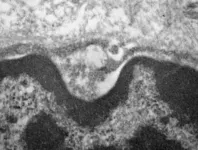(Press-News.org) Post-traumatic stress disorder (PTSD) rings a bell for many, due to its rampant references in pop culture, and more, importantly, its prevalence in today's society. It is only probable that this disorder, which develops after shocking or dangerous events, would unfortunately affect the lives of many people. Medical researchers have been hard at work trying to come up with solutions to combat this condition and its manifestations effectively. Unfortunately, the neurological mechanisms of PTSD aren't clear, and without knowing this exactly, trying to find a cure is a shot in the dark.
Fortunately, a group of Japanese researchers from the Sogo PTSD Institute, Medical Corporation Sogokai, Japan led by Dr. Masanobu Sogo appear to have made a breakthrough in PTSD treatment! They have identified a drug called trihexyphenidyl, that can significantly reduce the flashbacks and nightmares experienced by patients with PTSD, according to a study published in Brain and Behavior, a sister open access journal to ACTA J.
Trihexyphenidyl is a central anticholinergic drug used to manage disorders like parkinsonism, and alleviate several side-effects induced by drugs acting on the central nervous system (CNS). It acts by blocking the activity of a neurotransmitter, acetylcholine, in the CNS. Interestingly, it has been available for therapeutic use for around 66 years.
So, what inspired the researchers to pick up this drug? In 2009, they encountered a patient who suffered severe PTSD-related flashbacks and nightmares for 9 years, was diagnosed with bacterial diarrhea at another hospital, and administered a drip infusion containing antibiotics and scopolamine butyl bromide (SB), which is a peripheral anticholinergic that doesn't cross the blood-brain barrier (BBB, penetration rate 0.01%). Twenty minutes after the infusion, the patient's flashbacks completely disappeared!
Since SB is a "peripheral" anticholinergic agent, it shouldn't be able to cross the BBB, but it is probable that the patient's brain was in a state of severe brain excitement due to PTSD. There are eight acetylcholine basal ganglia in the brain, of which the largest, the Meynert nucleus, is closely associated with BBB permeability. The researchers hypothesized that due to abnormal excitement of the Meynert basal ganglia, SB enters the brain and activates anticholinergic action to suppress abnormal acetylcholine secretion of acetylcholine-memory-related circuits centered on the Meynert basal ganglia, eliminating the flashbacks.
From this valuable clinical experience, they figured that PTSD is generated through an acetylcholine-memory-related-circuit centered on Meynert. Based on this, Dr. Sogo and his team considered the use of a central anticholinergic agent: trihexyphenidyl.
Excited at the discovery, the researchers went on to devise an exploratory study, to check if trihexyphenidyl is effective against similar symptoms in other patients with PTSD. They administered trihexyphenidyl in 34 patients with PTSD, who had previously received psychiatric treatment for several years without therapeutic benefits, and determined its effect through interviews.
A significant 88% of the analyzed patients reported mild to no PTSD-related nightmares. Similarly, 79% of the analyzed patients reported similar responses for PTSD-related flashbacks. Notably, the researchers found that trihexyphenidyl has efficacy and a rapid onset (1-2 days) in the treatment of PTSD-related nightmares and flashbacks. Clearly, trihexyphenidyl is the elusive silver bullet against PTSD!
Dr. Sogo states, "To the best of our knowledge, this is the first pharmacological report describing the novel use of trihexyphenidyl for PTSD-related nightmares, which doesn't respond to conventional psychiatric treatment." While further studies are needed to prove the mechanism of PTSD, repurposing trihexyphenidyl to treat PTSD would be a promising turn of events, since the drug is inexpensive, and has no adverse effects. Here's to hope for patients suffering from PTSD, with the discovery of trihexyphenidyl!
INFORMATION:
Reference
Authors: Katsumasa Sogo, Masanobu Sogo, Yoshie Okawa
Title of original paper: Centrally acting anticholinergic drug trihexyphenidyl is highly effective in reducing nightmares associated with post-traumatic stress disorder
Journal: Brain and Behavior
DOI: https://doi.org/10.1002/brb3.2147
Affiliations: Sogo PTSD Institute, Medical Corporation, Sogokai, Hiroshima-city, Japan
About Dr. Masanobu Sogo
Dr. Masanobu Sogo is a researcher affiliated to Sogo Clinic, Hiroshima City, Japan. His primary research interests involve post-traumatic stress disorder and its treatment.
"Plant a hundred kinds of crops"
Wangjinzhuang village is nestled amongst the steep slopes of the South Taihang Mountains in Hebei Province, China. To prosper in the northern climate, the villagers have developed a tried-and-true strategy: "using the land to plant a hundred kinds of crops and not rely on the sky". Their fields contain red millet, white sorghum, purple and green eyebrow beans, and yellow radishes. Having survived for over a thousand years, this agrobiodiversity is a vibrant cornerstone of the village's agricultural heritage that is too precious to lose.
In an effort to combat dwindling crop diversity across China (the Ministry of Agriculture found that of 11,590 grain crop varieties planted ...
Cardiovascular drugs do not affect COVID-19 outcomes--such as disease severity, hospitalizations, or deaths--according to an analysis of all relevant studies published as of November 2020. The findings are published in the END ...
BOSTON - Significant amounts of atherosclerotic plaque have been found in the coronary arteries of people with HIV, even in those considered by traditional measures to be at low-to-moderate risk of future heart disease, according to a study published in JAMA Network Open.
This finding emerged from the global REPRIEVE (Randomized Trial to Prevent Vascular Events in HIV) study, in which Massachusetts General Hospital (MGH) is playing a key coordinating role. Researchers found that the higher-than-expected levels of plaque could not be attributed simply to traditional cardiovascular disease risk factors like smoking, hypertension, and lipids in the blood, but were independently related to increased arterial inflammation ...
The expected decline in the number of landfills across the United States coupled with bans on disposing large amounts of organic waste in landfills that have been enacted in multiple states has prompted researchers at the U.S. Department of Energy's (DOE's) National Renewable Energy Laboratory (NREL) to examine other ways to grapple with the issue of food waste disposal.
The researchers determined no single solution exists in the United States for dealing with food waste disposal. NREL researchers Alex Badgett and Anelia Milbrandt came to that conclusion after examining the economics involved in five different ways to ...
In Brazil, researchers at the University of São Paulo’s Medical School (FM-USP) have discovered that SARS-CoV-2 infects and replicates in the salivary glands.
Analysis of samples from three types of salivary gland obtained during a minimally invasive autopsy procedure performed on patients who died from complications of COVID-19 at Hospital das Clínicas, FM-USP’s hospital complex, showed that tissues specializing in producing and secreting saliva serve as reservoirs for the novel coronavirus.
The study was supported by FAPESP and reported in an article published in the Journal of Pathology.
The researchers said the discovery ...
Bioenergy crops are an alternative energy source that, unlike fossil fuels, could positively impact the environment by reducing greenhouse gases, soil erosion, and carbon dioxide levels. They can be produced even more sustainably if they are grown on poor quality land unsuitable for food. To make up for the poor land quality, these crops can rely on soil microbes like bacteria and fungi to help them access nutrients and water and store more carbon.
Switchgrass, a native prairie species, is championed as a promising bioenergy crop due to its ability to grow across many climates. ...
BUFFALO, N.Y. - How the media frame stories about science affects the public's perception about scientific accuracy and reliability, and one particular type of narrative can help ameliorate the harm to science's reputation sometimes caused by different journalistic approaches to scientific storytelling, according to a new study led by a University at Buffalo researcher.
"What our experiment shows is that the way the news media talk about science focuses too much attention on individuals in a way that doesn't accurately describe the way science actually works," says ...
Amid calls for racial and social justice nationwide, businesses and educational institutions are grappling with how to adopt more inclusive organizational practices, including more diversified hiring. However, recruitment teams and strategic leaders often blame their lack of a diverse workforce on a lack of diverse applicants. A large study of recruitment data suggests a simple and efficient way of increasing diversity in applicant pools: have more diverse recruitment committees and leadership teams.
The study, led by researchers at the University of Houston's Center for ADVANCING ...
Findings from a study published today [6 July] in the Journal of the American Medical Association (JAMA) have prompted new World Health Organization (WHO) recommendations to use interleukin-6 antagonists in patients with severe or critical COVID-19 along with corticosteroids.
A new analysis of 27 randomised trials involving nearly 11,000 patients found that treating hospitalised COVID-19 patients with drugs that block the effects of interleukin-6 (the interleukin-6 antagonists tocilizumab and sarilumab) reduces the risk of death and the need for mechanical ventilation.
The study, which was coordinated by WHO in partnership with King's College London, University of Bristol, University ...
ITHACA, N.Y. - As offices nationwide spring back to life, interior space designers and architects will soon have an easy-to-use planning tool to place indoor workplace furniture, staff, partitions and ventilation in a manner that maximizes fresh air flow and reduces the risk of airborne pathogens.
The Cornell Environmental Systems Lab in the College of Architecture, Art and Planning will introduce a new indoor module for their existing Eddy3D software, a professional-level airflow and microclimate simulator that can help improve ventilation.
The new indoor module will be released this summer, while the research supporting it will ...


